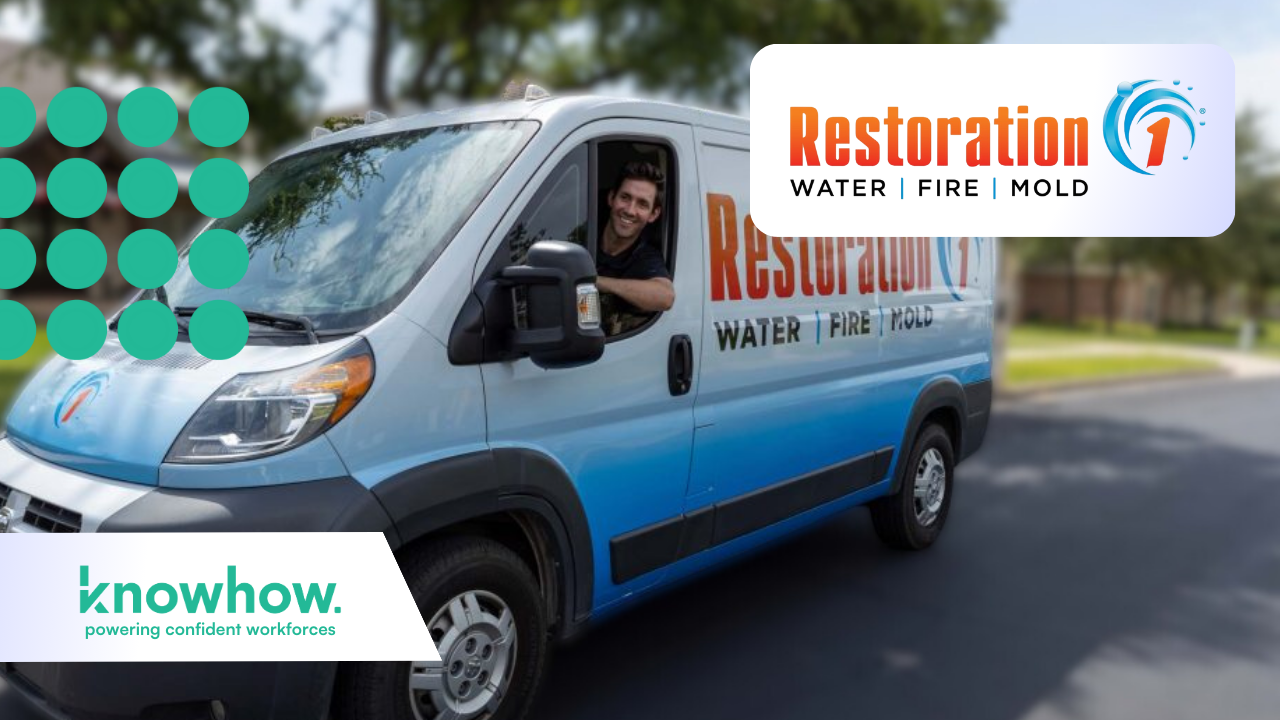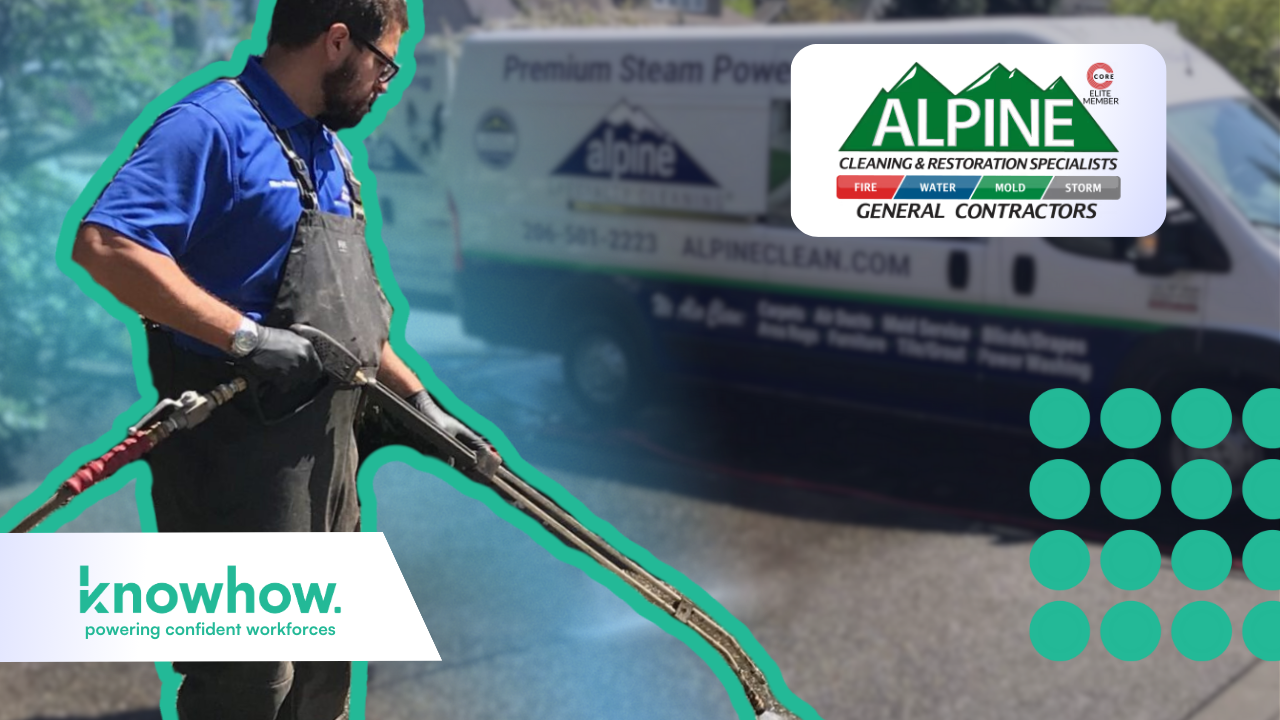
Breaking the Franchise Support Bottleneck With KnowHow


FRSTeam's corporate support team was excellent at their jobs. They knew the disaster restoration industry inside and out—28 different insurance carrier guidelines, specialized equipment protocols, and constantly evolving OSHA standards. When their franchisees called with questions, the support team had answers. They were responsive, knowledgeable, and committed.
But that expertise had become a constraint no one saw coming. As Ceilidh Baertschiger, Director of Franchise Operations, describes it: “All of the information about running a FRSTeam, operating a FRSTeam, was siloed in the brains of the humans that work on our corporate support team.”
Every answered call led to another call that would come in tomorrow, because knowledge transfer happened person-to-person, not system-to-system. The team couldn't scale their expertise without scaling headcount, and even then, they'd just be running faster on the same treadmill.
FRSTeam had tried to solve this the way any well-run franchise network would: they invested in a proprietary document repository. It was a smart move—centralize knowledge, make it searchable, reduce dependency on phone support.
For a while, it helped. But as the industry accelerated and the workforce shifted how they consumed information, that solution slowly became part of the problem.
People would search for keywords, pull up multi-page documents, scan for the specific guidance they needed, get frustrated, and call corporate anyway. The system designed to reduce support calls was generating more work than ever.
Outdated the Moment You Publish
Many trade service companies operate in permanent flux, which creates a knowledge management problem that other industries don't face. Insurance carriers renegotiate contracts and modify guidelines often. New equipment enters the market frequently. Safety protocols evolve rapidly.
FRSTeam manages 28 different national insurance programs, each with distinct Service Level Agreements, documentation protocols, and service standards. When carrier guidelines change and a crew doesn't know, jobs get delayed, reworked, or rejected—which, in turn, affects revenue.
The document repository couldn't keep up. Updates would be published, but there was no way to confirm who'd seen them or whether teams were working with current information. And there was a deeper problem emerging: the system reflected how people consumed information a decade ago, but the workforce was changing.
Newer team members—especially younger crew members—don't want to keyword-search through ten-page documents hoping to find one answer buried in paragraph six. They want to ask a question and get immediate, specific guidance. The mismatch between how they delivered information and how their teams needed to consume it was widening every week.
No one had designed this problem. They'd made reasonable decisions that had worked before. But the speed of restoration changes, workforce expectations, and information complexity was creating a gap that effort alone couldn't close.
A Platform Built for Trade Service Franchisees
FRSTeam implemented KnowHow, starting with a single hub before expanding to individual network hubs for each franchise location.
“It was a really slow start, trying to convince franchisees to get their own hub,” Bobbie Jo Burnett—Training and Onboarding Manager at FRSTeam—recalls.
However, FRSTeam's leadership made a strategic decision: rather than mandating adoption, they spent time with each office demonstrating what customization could mean for their specific operations.
“The more time that I was able to spend with each of the offices just to show them some of the unique [features] about KnowHow and how they can customize KnowHow to match their specific needs for their organization, they'd get a little bit more excited about it,” Bobbie explains.
Franchisees could also take FRSTeam's templates and adapt them, or build entirely new processes around services unique to their market. All approved by the corporate office, but tailored to their specific circumstances.
That's when the shift happened. Franchisees realized they weren't being handed a corporate mandate; instead, they were getting a tool they could shape to fit their daily reality. Offices that had been skeptical started requesting their own hubs. Franchisees began creating videos, documenting processes, and proactively filling gaps. They loved KnowHow’s video capability, whether capturing screen recordings for specific procedures or filming in the field and letting Howie, KnowHow’s proprietary AI assistant, help create the steps.
The cultural shift was comprehensive. As Bobbie recalls: Things went from “Where do I find this?” to “Hey, there's a KnowHow for that.”
When insurance guidelines changed, updates went live across the network immediately, eliminating confusion about who had the most current information. When new employees were onboarded, KnowHow's workforce feature automatically assigned relevant role-based workflows, so training was on-demand rather than event-based. Questions still come up in the field, but crews can pull up answers from KnowHow’s mobile app in real time instead of waiting on hold.
Here's how Bobbie describes the experience:
KnowHow pretty much takes the guesswork out of training and managing your processes. [...], it’s definitely a game changer.
What Tangible ROI Actually Looks Like
“The ROI [of KnowHow] is tangible,” says Ceilidh,
There's less rework, there's faster onboarding, there's fewer calls for help, and that adds up to real dollars saved. It's not just a nice-to-have. It's a system that pays for itself by freeing up your high-value people from repeating the same instructions.
But that ROI didn't just show up in efficiency metrics. FRSTeam restructured what their corporate team could focus on. As Ceilidh explains, “We used to have and needed to have national trainers. We no longer have those. We now have franchise business consultants to work with the owners to build their businesses.”
The phones still ring at FRSTeam corporate, but the conversations are about profitability, efficiency, and growth—all the things a franchisor should be focusing on.
That shift has had a significant impact on FRSTeam’s system-wide sales, because the focus has moved from repetitive training to strategic business support.
The Takeaway for Franchisors
If your corporate team spends more time answering operational questions than coaching business strategy, you're looking at a structural constraint on growth.
FRSTeam's transformation proves what happens when you give franchisees the tools to find answers themselves: your highest-value people get freed to do the highest-value work. When your corporate team stops answering the same questions and starts building franchisee businesses, the impact compounds: owners hit profitability targets faster, new locations launch without bottlenecks, and your network scales without doubling headcount.
As Ceilidh describes what that shift unlocked:
KnowHow opened up our team's capabilities to work on things that support growth, support the owners, instead of just answering individual questions all day long.
The systems that worked at 10 franchises may strangle you at 50. The question is, will you recognize the constraint before it costs you the next stage of growth?









